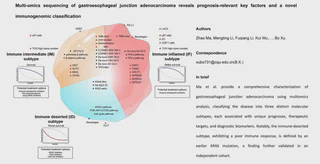Multi-omics sequencing of gastroesophageal junction adenocarcinoma reveals prognosis-relevant key factors and a novel immunogenomic classification
Jan 30, 2025· ,,,,,,,,,,,,,,,·
0 min read
,,,,,,,,,,,,,,,·
0 min read
Zhao Ma
Mengting Li
Fuqiang Li
Kui Wu
Xianxian Wu
Tian Luo
Na Gao
Huijuan Luo
Zhilin Sui
Zhentao Yu
Hongjing Jiang
Xiaobin Shang
Chuangui Chen
Jie Yue
Fianbiao Meng
Xiaofeng Duan
Bo Xu

Abstract
We found 30 mutated driver genes, 7 novel genomic signatures, 3 copy-number variations, and 2 V-J gene usages related to prognosis that were not identified in previous study. A high frequency of COSMIC-SBS-384-1 and De novo-SV-32-A was associated with more neoantigen generation and a better survival. Using 19 molecular features, we identified three immune-related subtypes (immune inflamed, intermediate, and deserted) with discrete profiles of genomic signatures, immune status, and clinical outcome. The immune deserted subtype (27.2%) was characterized by an earlier KRAS mutation, worse immune reaction, and prognosis than the other two subtypes. The immune inflamed subtypes exhibited the highest levels of neoantigens, TCR/pMHC-binding strength, CD8 + T-cell infiltration, IFN-α/γ response pathways, and survival rate.
Publication
In Gastric Cancer